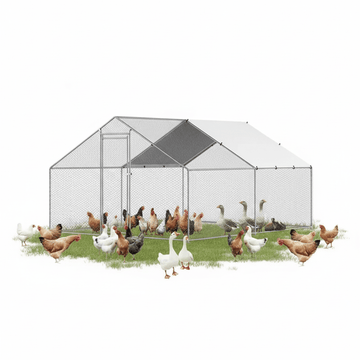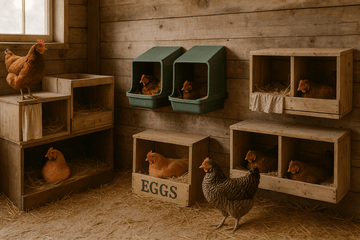Introduction
Maintaining cleanliness in chicken coops is crucial not only for the health and comfort of the chickens but also significantly affects their productivity, specifically egg-laying. Unhygienic conditions can lead to several issues, including disease, stress, and a reduction in egg production. This article delves into how dirty coops can impact chickens and provides actionable advice for keeping your coop clean.
Understanding Chicken Coop Hygiene
A clean chicken coop isn't just free from visible dirt and debris; it also needs to manage waste effectively, control parasites, and maintain a dry environment. Ammonia build-up, which can result from urine and feces not being cleaned up promptly, can cause serious respiratory problems and stress among chickens, which often leads to decreased egg production.
Impact of Coop Conditions on Egg Laying
The conditions inside a chicken coop directly influence the health and behavior of chickens, including their ability to lay eggs. Stressful environments caused by poor sanitation can lead to physiological changes in chickens, reducing their overall egg production. Additionally, diseases that thrive in dirty environments, such as salmonella, can lead to lower egg yield and sicker chickens.
Behavioral Changes in Chickens Due to Dirty Coops
A dirty coop does not only affect the physical health of chickens but can also lead to behavioral changes. Chickens in uncomfortable conditions may exhibit less social behavior, reduced feeding, and even aggression. These behaviors can further stress the flock, leading to a vicious cycle of health issues and productivity loss.
Maintaining a Clean Coop
Regular cleaning is essential for a healthy chicken coop. Daily tasks should include removing feces and turning over the bedding, while weekly tasks might involve a more thorough cleaning of the entire coop. Additionally, monthly checks should be done to ensure that the structure of the coop is intact and that there are no places for pests and parasites to thrive.
Best Practices for Coop Hygiene
Good coop hygiene starts with proper management practices. Using appropriate bedding, such as straw or wood shavings, and changing it regularly helps keep the coop dry and reduces the chance of disease. Proper ventilation is also crucial, as it helps disperse gases and moisture that can build up inside the coop.
Tools and Supplies for Effective Coop Cleaning
Essential tools for maintaining coop cleanliness include brooms, scrapers, and shovels for removing waste and old bedding. Safe cleaning agents such as vinegar or commercial non-toxic cleaners can be used for disinfecting surfaces without harming the chickens.
Preventing Common Health Issues with Cleanliness
Regular cleaning helps prevent the spread of parasites like mites and lice, which can cause health issues and decrease egg production. It also reduces the risk of diseases such as avian flu, which can devastate a flock.
Case Studies and Expert Opinions
Many experienced poultry farmers emphasize the importance of cleanliness in maintaining a productive flock. Research and case studies have shown that cleaner coops lead to healthier chickens and more consistent egg production.
FAQs
-
How often should I clean my chicken coop?
- Daily removal of waste and weekly deep cleaning are recommended.
-
What are the best materials for chicken coop bedding?
- Straw, pine shavings, and sand are effective, depending on your climate and coop design.
-
How do I know if my coop is too dirty?
- Signs include strong odors, visible waste buildup, and damp bedding.
-
What cleaning agents are safe to use around chickens?
- Vinegar and designated poultry-safe disinfectants are best.
-
Can a dirty coop affect the taste of the eggs?
- Yes, it can. Poor conditions can lead to poorer quality eggs and potentially tainted flavors.
-
Will chickens stop laying if the coop is dirty?
- Yes, chickens may stop laying eggs if the coop is too dirty. The stress, diseases, and discomfort caused by poor coop conditions can significantly reduce their egg-laying capacity.
Conclusion
Keeping a chicken coop clean is essential for the health of the chickens and the quality and quantity of their eggs. Regular and effective cleaning routines, along with good design and management practices, can significantly impact the wellbeing of your flock and the success of your poultry endeavor.





